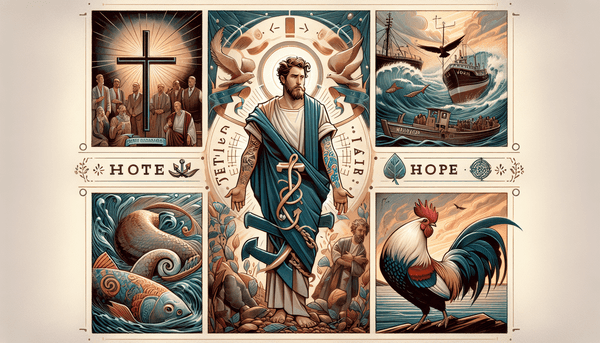Righteousness: Hungering for a Virtuous Life
Righteousness in the Biblical context is often associated with living a life that aligns with God's will and commandments. It encompasses the pursuit of justice, truth, and moral integrity. Jesus extolled the virtues of such a pursuit in the Beatitudes, saying, 'Blessed are those who hunger and thirst for righteousness, for they will be filled' (Matthew 5:6). This hunger for righteousness is a deep spiritual longing for a life that pleases God and brings about His kingdom on earth. The contrast between the life of the righteous and the wicked is a recurring theme in the scriptures. The righteous are promised life, prosperity, and honor (Proverbs 21:21), and they are shielded by God's favor (Psalm 5:12). The apostle Paul encourages believers to present themselves to God as instruments for righteousness (Romans 6:13), and John the apostle affirms that practicing righteousness is a hallmark of being in Christ (1 John 3:7).
Ministering: Serving Others in the Example of Christ
Ministering in the Christian context is an act of love, service, and caring for the needs of others. This service is modeled after Jesus Christ, who came not to be served but to serve others. He exemplified this through His teaching, healing, and ultimate sacrifice, stating, 'Just as the Son of Man did not come to be served, but to serve, and to give his life as a ransom for many' (Matthew 20:28). Ministering can take various forms, from visiting the sick and needy to sharing the gospel. It's a powerful way to demonstrate Christ's love, as we're called to serve one another through love (Galatians 5:13). The act of ministering not only impacts the community but also fosters individual spiritual growth, as seen in Hebrews 6:10 and 1 Peter 4:10, which remind us of God's appreciation for our service and the importance of using our gifts to serve others. To understand more about Jesus's identity and His mission, you can read about Emmanuel, the presence of God in our midst.
Scorn and Disdain: Attitudes Warned Against in Scripture
The Bible is clear about the destructive nature of scorn and disdain. These attitudes stem from pride and lead to divisiveness and conflict. Scripture warns against such behavior, advocating for humility and respect. In Proverbs 3:34, we're told that God mocks the proud but shows favor to the humble and oppressed. The book of James reminds us that God opposes the proud but gives grace to the humble (James 4:6). The wisdom literature of the Bible, particularly the Psalms and Proverbs, is rich with admonitions against scornful behavior. Psalm 1:1 praises the one who avoids the company of mockers, while Proverbs 29:8 and 22:10 highlight the strife and conflict that scornful individuals can cause within a community.
Genealogies and Creation: The Beginnings in Matthew and Genesis
The genealogies listed in the Gospel of Matthew and the creation account in Genesis serve as foundational elements in Christian belief, anchoring the story of Jesus Christ and humanity itself in a divine narrative. Matthew's genealogy establishes Jesus' rightful place in the lineage of David and Abraham, fulfilling the prophecies and promises of the Old Testament (Matthew 1:1). The angel's message to Joseph, which cites the prophecy that Jesus 'will save his people from their sins' (Matthew 1:21), is a testament to the meticulous plan of salvation woven throughout scripture. Similarly, the creation narrative in Genesis sets the stage for understanding our origins and purpose, declaring the inherent goodness of God's creation (Genesis 1:31) and humanity's unique role within it, being made in God's own image (Genesis 1:27).
Conclusion
The Bible serves as an inexhaustible source of wisdom and guidance for believers, providing instructions on how to live in a way that reflects God's will. From the allegorical celebration of love in the Song of Songs to Jesus' embodiment of ministering through service, the scriptures offer us a blueprint for a life of love, righteousness, and humility. By exploring themes such as the identity of Mary, the treatment of creation, and the divine nature, we foster a deeper understanding of our relationship with God and with one another, building a foundation for a life that honors the sacred narrative of creation and the lineage of faith that connects us all.
FAQ
Q: What is the Song of Songs?
A: The Song of Songs, also known as the Song of Solomon, is a book in the Old Testament of the Bible. It is a collection of love poems that explore the beauty and intimacy of human love, often using allegory to symbolize the love between God and his people.
Q: What does it mean to minister?
A: Ministering, as described in the Bible, involves serving and caring for the needs of others. It includes acts of compassion, support, and spiritual guidance, exemplified by Jesus Christ, who ministered to people by teaching, healing, and showing love and mercy.
Q: What does disdain mean?
A: Disdain refers to a feeling of contempt or scorn toward something or someone. In the Bible, it is often associated with a haughty or arrogant attitude, which is cautioned against.
Q: What does it mean to scorn?
A: To scorn is to show open dislike and disrespect or to regard someone or something as unworthy. The Bible cautions against scornful behavior as it can lead to conflict and division among people.






